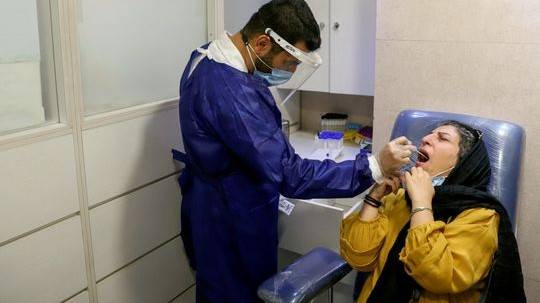Iran's daily Covid caseload exceeds 40,000 in new high

Stay tuned with 24 News HD Android App

Iran's daily Covid caseload crossed the 40,000 mark on Monday, its health ministry said, marking a new record in infections and deaths for the second day running.
In the past 24 hours, 40,808 people tested positive for the coronavirus and 588 died, it said.
The latest figures bring the total number of infections to 4,199,537 since the pandemic started and the number of deaths to 94,603.
Iranian health officials have acknowledged that the Islamic republic's Covid figures underestimate the real toll.
Iran remains the Middle East country worst hit by the pandemic.
Covid infections have been surging since June, in what officials have warned is a "fifth wave" caused by the highly infectious Delta variant.
Tehran, with a population of over eight million, is facing the highest numbers of deaths, infections and hospitalisation, according to Nader Tavakoli, deputy head of the capital's virus task force.
He also told ISNA news agency "we will see deaths increase in the coming days".
"We have no idea when we would reach the peak of this fifth wave," Tavakoli said, adding that Tehran's hospitals and emergency wards are overburdened.
Iran has pinned its hopes on vaccinations to help with the health crisis, but the innoculation campaign launched in February has progressed slower than authorities had planned.
Choked by US sanctions that have made it difficult to transfer money abroad, Iran says it is struggling to import vaccines for its 83-million-strong population.
More than 13 million people have been given a first vaccine does, but only 3.7 million have received the necessary two jabs, the health ministry said Monday.
More than half of Iran's 448 counties including Tehran are currently listed as "red" -- the highest risk level on the country's colour-coded scale, according to the ministry.
In red zones, all commercial activity must shut down except for those considered essential, such as grocery stores and pharmacies.
But malls and small retail shops in northern and central Tehran were still operating, according to AFP journalists.
Iran has avoided imposing a full lockdown on the population, and instead resorted to piecemeal measures such as temporary travel bans and business closures.
Iran's last serious restrictive measure came in late July, when the government ordered government offices and banks in the Tehran and neighbouring Alborz province to close for six days.
